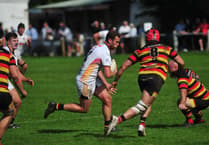AS THE Jewson Western League season continues to roll on, fans and players alike might notice some subtle yet significant law changes on the pitch. The league’s podcast sat down with Dave Brammer, the league's finance director and a highly respected former Premier League match official, to delve into the new laws that are influencing play in the Western League this season.
The first change that has been introduced concerns the drop ball.
Previously, if the referee stopped play, the ball would be dropped to the last team in possession. The updated law introduces a more nuanced approach.
Inside the penalty area, the ball remains dropped for the defending team's goalkeeper, regardless of who last had possession. Outside the penalty area, the referee drops the ball for one player of the team that would have gained possession, provided this can be clearly determined. If it's unclear, the ball goes to the player of the last team that touched it.
This change aims to ensure greater fairness in situations where possession was clearly heading to an opponent before play was stopped.
Perhaps the most discussed change, and one generating considerable media attention, is the new 8-second law for goalkeepers. This replaces the old 6-second rule, which Brammer noted was rarely penalised. The core of the new law is that a corner kick is awarded if a goalkeeper, while in control of the ball within their penalty area, holds onto it for more than 8 seconds.
"Control" is broadly defined: it includes when the ball is between hands/arms, or hands/arms and a surface, held in an outstretched open hand, or even when bouncing or throwing it in the air. Crucially, the 8-second count begins as soon as the goalkeeper gains control – so tactics like falling to the ground after a catch will eat into their allotted time.
However, if a goalkeeper dives to make a save, the referee will allow time for them to stand up before the clock starts. Referees will also signal the final 5 seconds with a raised hand to assist goalkeepers.
Forwards attempting to impede a goalkeeper's release of the ball can be penalised with an indirect free kick and potentially a yellow card, just as goalkeepers who repeatedly infringe the 8-second rule can also face sanction.
An important guideline has also been introduced, particularly at Step 5 and 6 (Western League) levels, focusing on respect and fair play towards match officials. Recognising that referees are often subjected to verbal and physical dissent, this guideline aims to foster stronger collaboration between officials and team captains.
Under this new guidance, only team captains are allowed to approach the referee to discuss key decisions, provided they do so respectfully. It is then the captain's responsibility to ensure their teammates remain at a reasonable distance and do not interfere.
Any player, including the captain, who shows dissent by word or action will be shown a yellow card and sent to the sin bin. If the goalkeeper is the captain, another player must be nominated to take on this role.
This initiative hopes to reduce instances of players mobbing or surrounding referees, promoting a more transparent and less confrontational environment.
Brammer, reflecting on his observations, believes this new guideline has worked "quite well" in practice. He also stressed the importance of clubs carefully considering who they appoint as captain, choosing someone who can remain respectful even in heated moments.
The full interview can be found on episode 6 of the Jewson Western League Podcast, available through the Western League website https://www.westernleague.co.uk/.





Comments
This article has no comments yet. Be the first to leave a comment.